|
|
IX EFMC INTERNATIONAL SYMPOSIUM ON ADVANCES IN SYNTHETIC AND MEDICINAL CHEMISTRY (EFMC-ASMC 2023) – SHORT REPORT
The 9th edition of the EFMC International Symposium on Advances in Synthetic and Medicinal Chemistry (EFMC-ASMC 2023) took place on September 3-7th, 2023 in Zagreb, Croatia.
Over 550 international scientists gathered to listen to the cutting-edge science presented by the 30 invited speakers, 11 oral communications and 369 poster presenters over the five days of the conference.
The opening ceremony was led by the symposium chairs, Prof Karl Gademann (University of Zürich, Switzerland) and Dr Ingo Hartung (Merck, Germany), the EFMC President, Prof. Rui Moreira (University of Lisbon, Portugal) and the Representative of the Medicinal & Pharmaceutical Chemistry Section of the Croatian Chemical Society, Dr Vesna Gabelica Markovic. The ceremony was followed by an inspiring lecture by Prof. Jeffrey Bode (ETH Zurich, Switzerland) on “Synthetic and Medicinal Chemistry for Biologics” and a welcome reception gathering all participants in an informal atmosphere.
Over the course of the event, participants attended a busy programme of seven session mixing talks equally selected from industry and academia, one first-time disclosure, the lectures of the EFMC Prize for a Young Medicinal Chemist or Chemical Biologist in Academia and in Industry, as well as three poster sessions. Among the posters presented, five were awarded an EFMC Best Poster Prize. Five young scientists were also awarded a free subscription to the event by the EFMC.
Amongst many highlights of the programme were the prize lectures by Prof. Georg Winter (Research Center for Molecular Medicine of the Austrian Academy of Sciences, Austria) and Dr Teresa De Haro Garcia (UCB, Belgium), the Chemistry Europe Lecture of Prof. Nuno Maulide (University of Vienna, Austria), the RSC Medicinal Chemistry Lectureship given by Prof. Christoph Nitsche (Australian National University, Australia). The closing lecture was delivered by Prof. Ryan Shenvi (Scipps Research, United States).
Several networking opportunities were offered, and 22 exhibitors, to whom we are thankful for their support. To conclude the event in style, a conference dinner was hosted at "Heart by Lido", a magnificent glass hall with view of Lake Jarun and surrounded by greenery.
We would like to thank again all our committee members, speakers, sponsors, exhibitors, and of course participants for their support – and we look forward to warmly meeting you all in Porto, Portugal for the X EFMC International Symposium on Advances in Synthetic and Medicinal Chemistry (EFMC-ASMC 2025), which will take place on August 31-September 4th, 2025. EFMC PRIZES CEREMONIES
Hosted during the IX EFMC International Symposium on Advances in Synthetic and Medicinal Chemistry (EFMC-ASMC 2023), the EFMC Prizes ceremonies were the occasion to thank the individuals who contributed to strengthening the position of medicinal chemistry, chemical biology, or related fields in Europe.
Prof. Georg Winter (Research Center for Molecular Medicine of the Austrian Academy of Sciences, Austria) received the EFMC Prize for a Young Medicinal Chemist or Chemical Biologist in Academia.
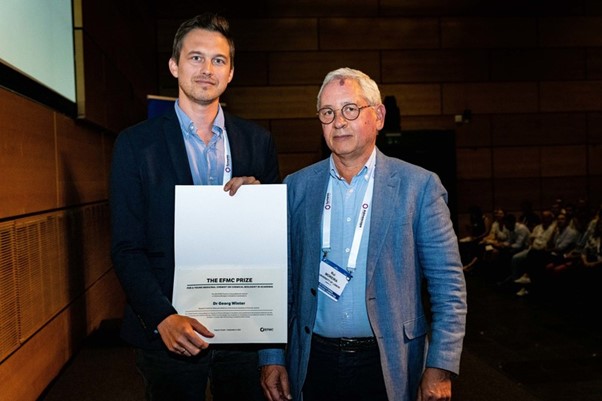
Prof. Georg Winter & Prof Rui Moreira. Credits: Fabien Venturi.
Dr Marco Di Antonio (Imperial College London, United Kingdom) and Dr Valle Palomo (IMDEA Nanociencia, Spain) have been recognised as the most meritorious runners-up.
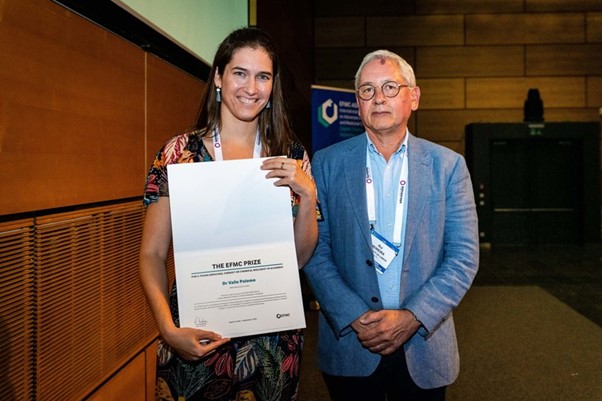
Dr Valle Palomo & Prof Rui Moreira. Credits: Fabien Venturi.
Dr Teresa De Haro Garcia (UCB, Belgium) received the EFMC Prize for a Young Medicinal Chemist or Chemical Biologist in Industry.
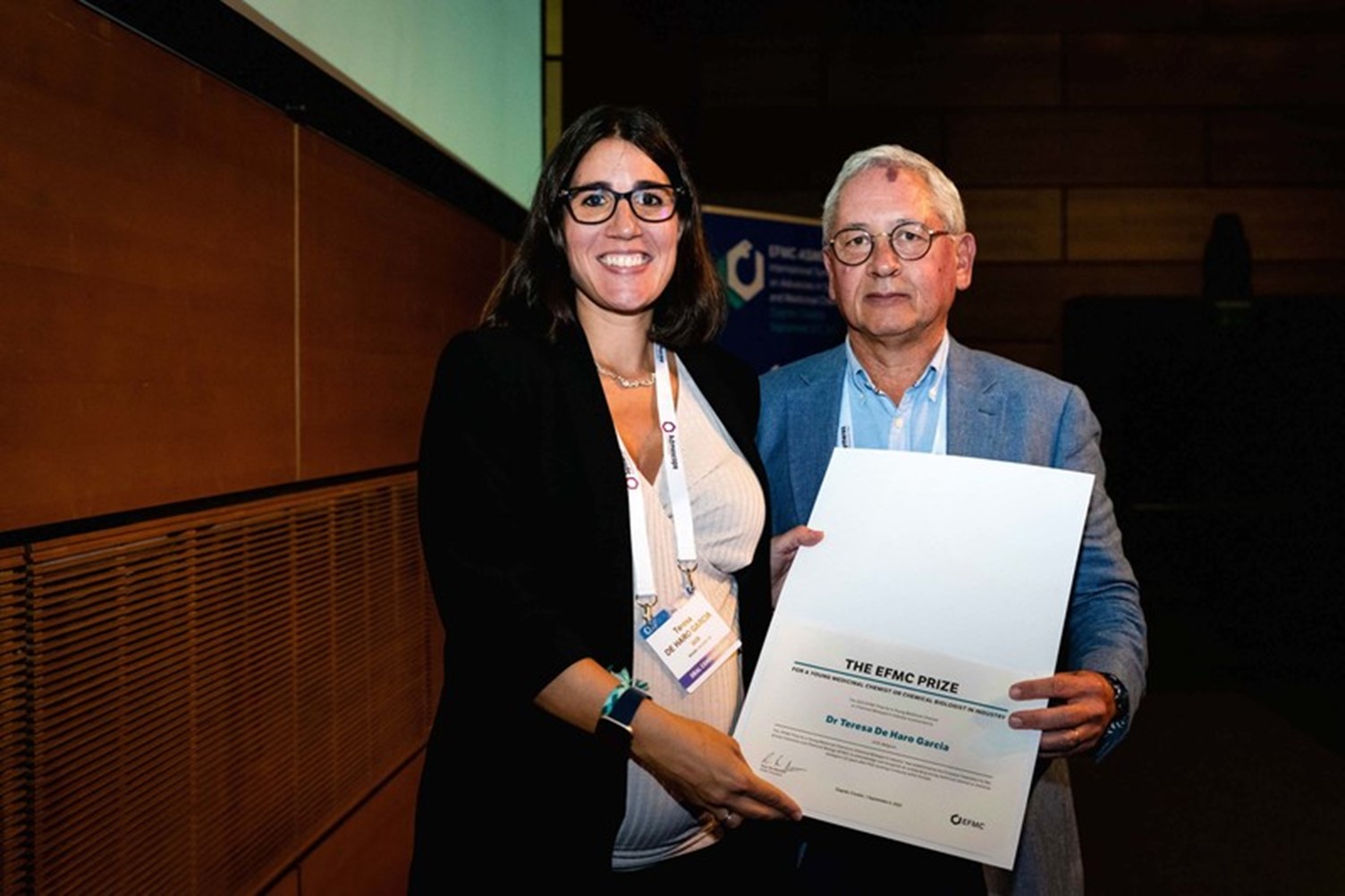
Dr Teresa De Haro Gargia & Prof Rui Moreira. Credits: Fabien Venturi.
Dr Jean Baptise Langlois (Novartis, Switzerland) and Dr Afjal Miah (GlaxoSmithKline, United Kingdom) have been recognised as the most meritorious runners-up.
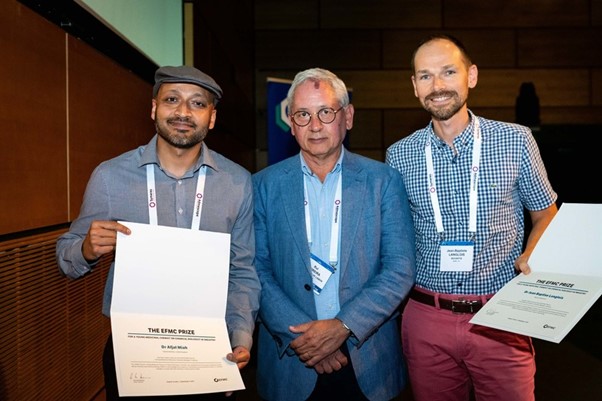
Dr Afjal Miah, Prof Rui Moreira & Dr Jean Baptiste Langlois. Credits: Fabien Venturi. EFMC BEST POSTER PRIZES
The EFMC Best Poster Prizes have been granted to the following participants:
- Grand Prize
- Jack Phelps, Monash University, Australia
- Chemistry Europe Best Poster Prizes
- Adela Simkova, IOCB Prague, Czech Republic
- Maayan Lavie, Weizmann Institute, Israel
- Yikai Song, Monash University, Australia
- Janne Wiedmann, Karlsruhe Institute of Technology, Germany
Congratulations to all!
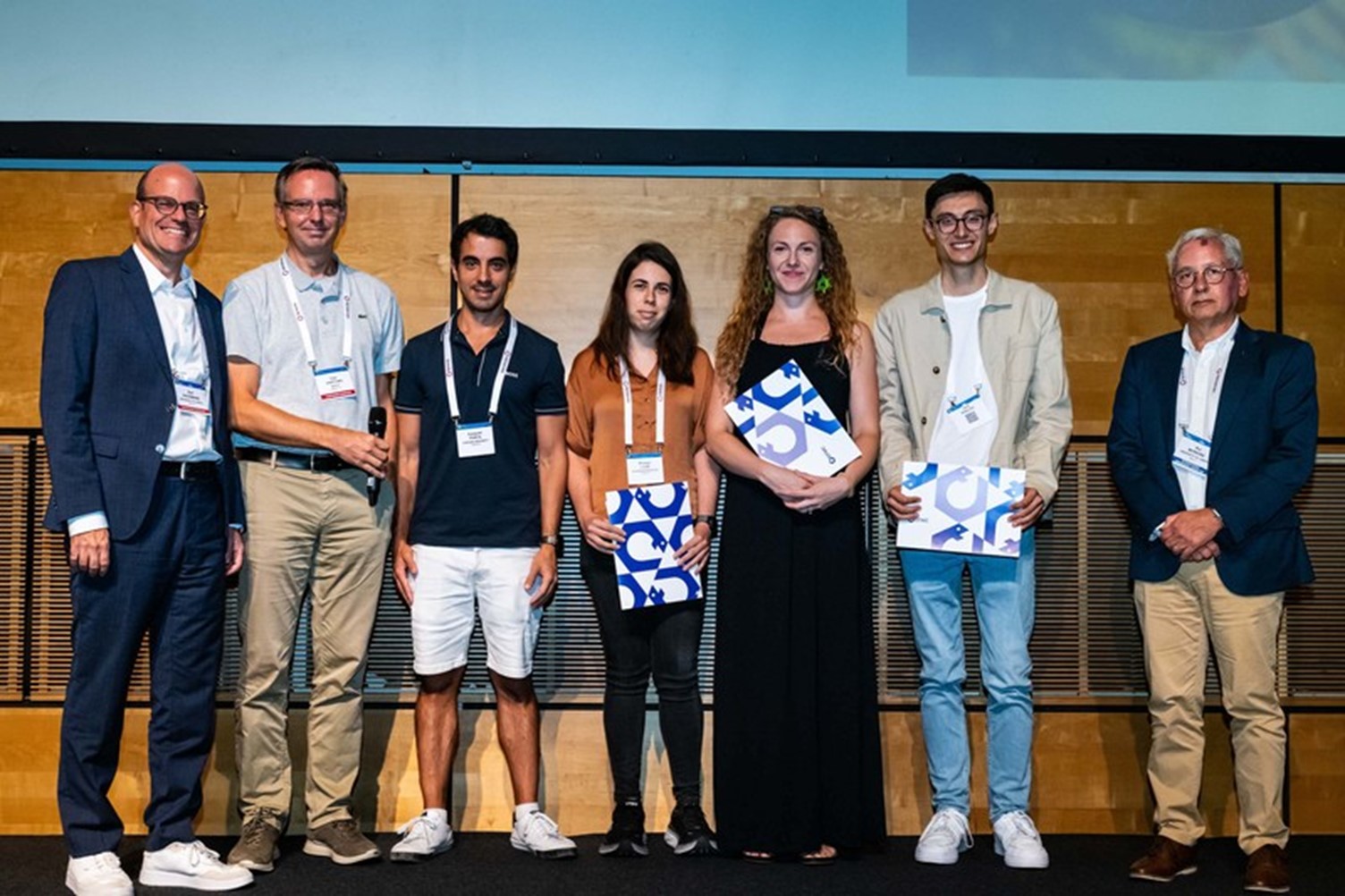
Credits: Fabien Venturi 2024 IUPAC-RICHTER PRIZE IN MEDICINAL CHEMISTRY – CALL FOR NOMINATION
The 2024 IUPAC-Richter-Prize will be presented during the XXVIII EFMC International Symposium on Medicinal Chemistry (September 1-5, 2024) in Rome (Italy) and the recipient will also give a lecture on the subject of their research at the 38th ACS National Medicinal Chemistry Symposium (June 23-26) in Seattle, WA, United States. The prize is to be awarded to an internationally recognized scientist, preferably a medicinal chemist, whose activities or published accounts have made an outstanding contribution to the practice of medicinal chemistry or to an outstanding example of new drug discovery
Prize USD 10 000
The Prize has been established by a generous gift from the Chemical Works of Gedeon Richter, Plc. (Budapest, Hungary) to acknowledge the key role that medicinal chemistry plays toward improving human health.
Applicants should be received by NOMINATION only, with just one person needing to serve in that capacity, although a total of five (5) individuals should be listed as referees overall. The package must be submitted electronically and should contain a complete resume, a professional biography of not more than two pages, and a one-page summary of what the individual considers to be their activities, accomplishments and/or publications that have had the most significant impact upon the field of Medicinal Chemistry. The material will be forwarded confidentially to an independent selection committee appointed by the IUPAC Subcommittee on Medicinal Chemistry and Drug Development.
For further information please contact Prof. Janos Fischer, Member of the IUPAC Subcommittee on Drug Discovery and Development, by email at j.fischer@richter.hu.
Nomination materials should be uploaded by 15 December 2023 to IUPAC Secretariat via the following form. LITERATURE SPOTLIGHT
The “literature spotlight” section of the newsletter will bring you a summary of recently published research in a concise and accessible way. Multiple thematics from different journals will be highlighted thanks to the valuable contribution of members of the EFMC working groups.
This contribution will focus on the recently published article “Development of Multivalent Conjugates with a Single Non-Canonical Amino Acid” (by Burrow et al. in ChemBioChem).
In this study Burrow et al harnessed the properties of non-canonical amino acids (ncAAs) to generate multivalent conjugates using a single change in the protein sequence. Traditional methods often relied on complex linker systems or multiple ncAAs, presenting challenges in terms of efficiency and precision.
A handle for bioconjugation, p-bromopropargyloxyphenyalanine (pBrPrF), was first genetically encoded in the proteins. Next, copper-assisted cycloaddition reaction coupled with a subsequent Sonogashira cross-coupling were employed to link two additional molecules to the model proteins. This approach offers numerous applications in both therapeutics and diagnostics as multiple unique moieties can be introduced into proteins in a highly controlled fashion.
Naya K. Burrow, Robert K. Gourdie, Elizabeth A. King, Christopher R. Travis, Cameron M. Goff, Zachary M. Nimmo, Justin M. Berg, Emily L. Boyt, Douglas Dean Young. "Development of Multivalent Conjugates with a Single Non-Canonical Amino Acid." ChemBioChem (2023). https://doi.org/10.1002/cbic.202300565 NEW WEBINAR ANNOUNCED: EFMC² TANDEM TALKS!
EFMC² Tandem Talks, jointly organised by the EFMC and the EFMC Computational Chemistry Initiative (EFMC²) are designed to give you real life insights into how medicinal and computational chemists can drive projects together. The tandem talks feature a balanced perspective from both sides. In this online seminar and discussion format you can hear about case studies where collaboration between the disciplines was key and discuss what makes the essence of successful MedChem-CompChem interaction now and in the future.
The first edition will take place on November 28 at 16:30 CET. Sandra Handschuh & Theodor Theis (Boehringer Ingelheim) will deliver a lecture on “Real World Use of FEP+ Calculations - Lessons Learned at Boehringer Ingelheim” before joining the round table discussion to interact with the attendees.
The ample opportunity to engage and discuss with our speakers sets these webinars apart. Save the date and learn not only about great science but also which ways of collaborating were key to success.
More information on EFMC² Tandem Talks (efmctandemtalks.org).
EFMC-YSN REVIEWER ACADEMY, POWERED BY CHEMISTRY EUROPE
The reviewer academy is a program hosted by EFMC’s Young Scientists Network and conducted by professional editors of Chemistry Europe / Wiley-VCH to help train future referees. The academy aims to teach best practices in peer review, especially for early-career researchers.
The academy is a rolling program throughout the year, which consists of a live one-hour workshop and Q&A session (4 times a year); an online workshop (c/o Wiley Research/Reviewer Academy); actual peer review assignment and evaluation.
Next Live Workshop and Q/A Session: October 18th - 10:00-11:00 CET | Register
More information on www.efmc.info/reviewer-academy.
PHOTO COMPETITION 2023: ILLUMINATING REALITY - WINNERS ANNOUNCED!
The Communication Team is delighted to announce the winner and two runners-up of the 2023 Photo Competition.
- Chemical Symphony: A Vivid Glimpse into the Microcosmos – Exequiel Porta (Winner)
- Fifty shades of fluorescence – Luce Mattio (Runner-up)
- Land and sky – Luke Damerum (Runner-up)
Congratulations to all the contestants for their participation! All the pictures will remain available on the EFMC website, and some will be displayed in the future editions of the MedChemBioWatch.

Winning Picture: Chemical Symphony: A Vivid Glimpse into the Microcosmos. Credits: Exequiel Porta GET TO KNOW DIDIER ROCHE, EDELRIS, FRANCE
In this edition, our MedChemBioConversations is with Didier Roche from Edelris, France. Get to know him better by reading the interview below:
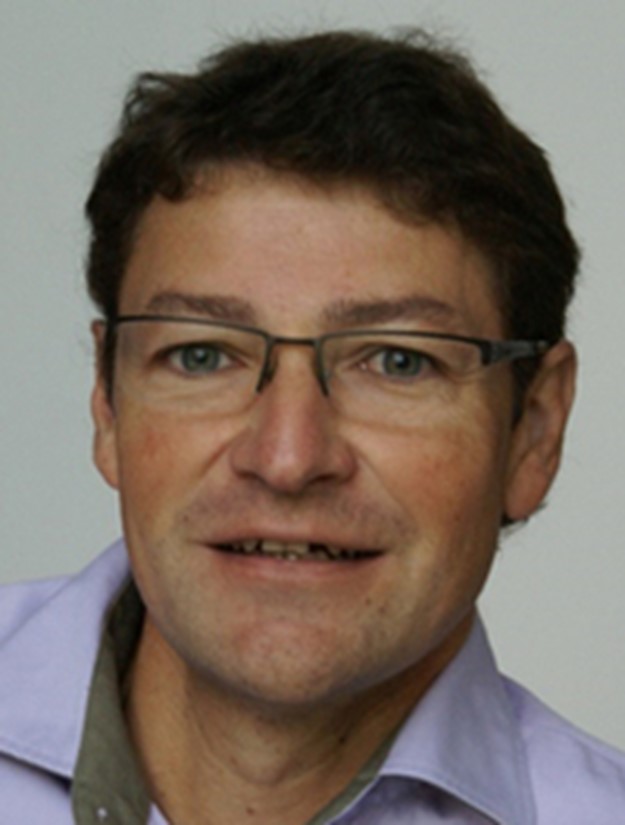
How did you get interested in Medicinal Chemistry?
I was first attracted by the beauty and complexity of natural product total synthesis and was trained therefore as an expert in asymmetric synthesis. My PhD was, however, already focused on the development of HIV inhibitors and this medchem training was reinforced during my industrial postdoc position at Novartis working on selectins and integrins. I got my PhD in asymmetric synthesis from the university of Strasbourg in 1995. Strasbourg has always been a centre of excellence in chemistry in Europe and I definitely learnt a lot.
Where did you have your postdoc position?
I did my postdoctoral study in Central Research at Ciba-Geigy. This experience was extended for one year in the transplantation department at Novartis following Sandoz and Ciba-Geigy merger. This gave me the opportunity to work on 2 different sites in Basel Switzerland and East Hanover US and to discover different cultures of working.
Where are you currently working and what is your current position?
I am Chief Scientific Officer at Edelris, a CRO company I have co-founded in 2005.
What are your current research interests?
My strong interest remains in the identification of molecular tools to explore new targets related to diseases that could potentially lead to the identification of a drug. We explore new molecular frameworks based on innovative chemistry and have developed a specific expertise in affinity selection-mass spectrometry to assess the activity of these compounds against challenging targets.
My work requires performing scientific intelligence, developing R&D projects and ensuring financing and monitoring. I like to stay in close contact with the team to stimulate their creativity and help them as much as I can in solving problems. Ensuring the worldwide visibility of the company is also a priority. Networking and communication are among the tasks affiliated with my responsibilities. The most exciting is to foster creativity and work with a bunch of multidisciplinary experts to achieve a specific goal. I never got bored of that after 30 years in this field.
How many PhD students and postdocs do you currently supervise?
I have the responsibility of one PhD student in the frame of an MSCA-Innovative Training Network collaboration aiming at the identification of inhibitors of helicases. We have applied for another public funding to host one PhD student working on RNA modulation.
As supervisor, I always tried to motivate my collaborators to give the best of themselves, to provide them with a stimulating environment and act as a facilitator instead of a controller.
What do you consider your greatest achievement in your scientific career?
I have directly contributed to the clinical development of 4 drug candidates and have co-founded Edelris, a Drug Discovery CRO company that has been in activity now for 18 years. We have overall recruited and trained over 100 PhD since the inception and this is probably my best reward.
Which of your papers are you most proud of and why?
As a young process chemist, I have published in 2001 an article in Org. Process R&D describing the optimization and scale-up of a novel process for 2-aminoindan hydrochloride production. At Novartis, the scale-up of a drug candidate was compromised due to a shortage of the main starting material 2-aminoindan. Under the guidance of my mentor Kapa Prasad, I proposed to prepare this material by an unprecedented route which turned out to be successful and allowed the due delivery of one first batch of the drug candidate.
What are the features of a successful PhD student or postdoc?
A good researcher should be thoughtful, curious and persevering. As stated by Pasteur “Fortune favours the prepared mind”!
What would you like to ask from other medicinal chemists?
Although we are working in a competitive field, we should not forget that our ultimate goal is to provide new therapies for patients. I would advocate sharing failures and successes through collaborative networks, publications, and conferences.
Have you experienced any unfair situations during your scientific career? How would you advise scientists facing similar situations?
Certainly. I remember one particular situation where a project was heavily relying on the synthesis I had developed of a complex natural product. This project was at one time transferred to another department and I was eventually not cited as a co-author on the patent application. Rewarding individuals in a multidisciplinary process implying a long list of contributors is not always easy.
What is the most embarrassing thing you have done in the lab while doing experiments, e.g. explosions?
During my first years at the university, we used to dry glassware with an open-flame Bunsen burner. I accidentally set fire to a Dewar vessel containing acetone. The fire was fortunately stopped very quickly with the intervention of a more experienced supervisor.
What are your recommendations for a book, podcast, website, blog, YouTube channel or film?
I like to advertise for young medicinal chemists the EFMC webinar “Best practice in medicinal chemistry”. The Suisse course on Medicinal Chemistry organized for many years by my former supervisor Beat Ernst is also a fantastic training for young medicinal chemists. The Kerns “Drug-like properties: concepts, structure design and methods” has been for many years my bible when working on improving ADME/tox properties of compounds. Among the blogs, Derek Lowe’s commentary on drug discovery “In the Pipeline” is certainly a must-read.
Which scientist do you admire the most and why?
Barry Sharpless two times Nobel prizer in Chemistry. His work opened whole new scientific frontiers that have had a major impact on the fields of chemistry, biology and medicine.
Which field of medicinal chemistry do you consider the most promising for the future?
The field of PROTACs and molecular glues has reactivated a strong interest in small-molecule drug discovery. This is very exciting for our community which has suffered for the last 20 years from the competition with New Biological Entities (NBE).
What would you expect to be the next major breakthrough in medicinal chemistry?
When compared to disciplines like engineering, medicinal chemistry remains very experimental. Computational chemistry has not delivered yet the results expected to provide better predictions and accelerate the Design-Make-Test-Analyse cycle (). I expect a real breakthrough of artificial intelligence in the years coming. PUTTING COMMUNITY COMPOUNDS TO GOOD USE: AN OPEN COMPOUND SHARING INITIATIVE
The quality of a screening collection is one of the most critical factors of success in drug discovery. Compound collections often predominantly consist of compounds that are commercially available, but compounds synthesized by academic chemists as well as natural products represent a rich, untapped source of chemical diversity.
Organic chemists produce a myriad of compounds, often designed for specific activities against a certain target or phenotype. Only the very few most promising compounds, e.g., those with a high activity in a specific assay, are usually used in further studies, while the vast majority of these compounds are stored on shelves and in fridges unused. This despite the significant effort in time and resources that was invested in producing the compounds. Furthermore, compounds with a low activity against the target, for which they have been synthesized, may be active and useful against another target or in an unrelated assay. Unfortunately, chemists who synthesized these compounds often have limited opportunities to systematically test their compounds against a wide variety of biological targets in order to uncover these hidden biological activities. The consequence is that too many compounds remain unused and inaccessible for other researchers.
The international research infrastructure EU-OPENSCREEN supports discovery projects in early drug discovery by democratizing access to technology platforms, expertise, and compound collections and by creating a pre-competitive network of like-minded researchers.
With the aim to make this rich chemical resource accessible to a broader scientific community and to allow chemists to uncover novel bioactivities of their compounds, the publicly funded open-access initiative EU-OPENSCREEN offers chemists the opportunity to make their compounds available, in a regulated and transparent framework, to a wider community of biologists, who test these compounds in suitable bioassays. By doing so, chemists can expose their compounds to a broad range of different biological/drug targets to uncover the unknown bioactivities of their compounds, which would otherwise not be practical through individual one-to-one collaborations. Once a compound has been identified as a validated hit compound, a research collaboration between the chemist (who submitted the compound) and the biologist (who developed the bioassay) can be initiated.
EU-OPENSCREEN’s ca. 30 academic partner institutions offer complementary expertise and instrumentation to collaboratively develop novel chemical probes for the life sciences community. Primary screening data are made available to the scientific community through its open-access European Chemical Biology Database. EU-OPENSCREEN also promotes knowledge sharing within life science by organizing webinars and training activities, and by co-organizing the biennial European Chemical Biology Symposium. #MEDCHEMCASES - SEMINAR BY THE DIVISION OF MEDICINAL CHEMISTRY OF THE GERMAN CHEMICAL SOCIETY (GDCH
The MedChem Division of the German Chemical Society (GDCh) would like to invite you to the next #MedChemCASES online seminar which will be held on October 25 by Dr Daniela Angst (Novartis).
The topic of the webinar will be “Remibrutinib, a covalent BTK inhibitor with best-in-class selectivity: discovery and clinical results”.
Bruton’s Tyrosine Kinase (BTK), a cytoplasmic tyrosine kinase, is selectively expressed in a subset of immune cells, including macrophages, mast cells, and B cells. BTK is a key regulator of B cell antigen receptor signaling in B cells and of Fc receptor signaling in mast cells and macrophages. It is likely that a BTK inhibitor will have a positive impact on autoimmune diseases which are caused by autoreactive B cells and immune-complex driven inflammation.
First generation BTK inhibitors have been approved for the treatment of B-cell malignancies, but their use is associated with adverse events due to inhibition of off-target kinases.
The presentation will cover the design, characterization, and medicinal chemistry optimization of a series of highly selective covalent BTK inhibitors stabilizing an inactive confirmation of BTK. The efforts resulted in the identification of remibrutinib (LOU064) as a highly potent inhibitor with a best-in-class selectivity profile. Remibrutinib showed high potency and was well tolerated in Ph1 and Ph2 clinical trials and is currently in Ph3 clinical studies for chronic spontaneous urticaria and multiple sclerosis. We will report the preclinical profile as well as clinical data of remibrutinib.
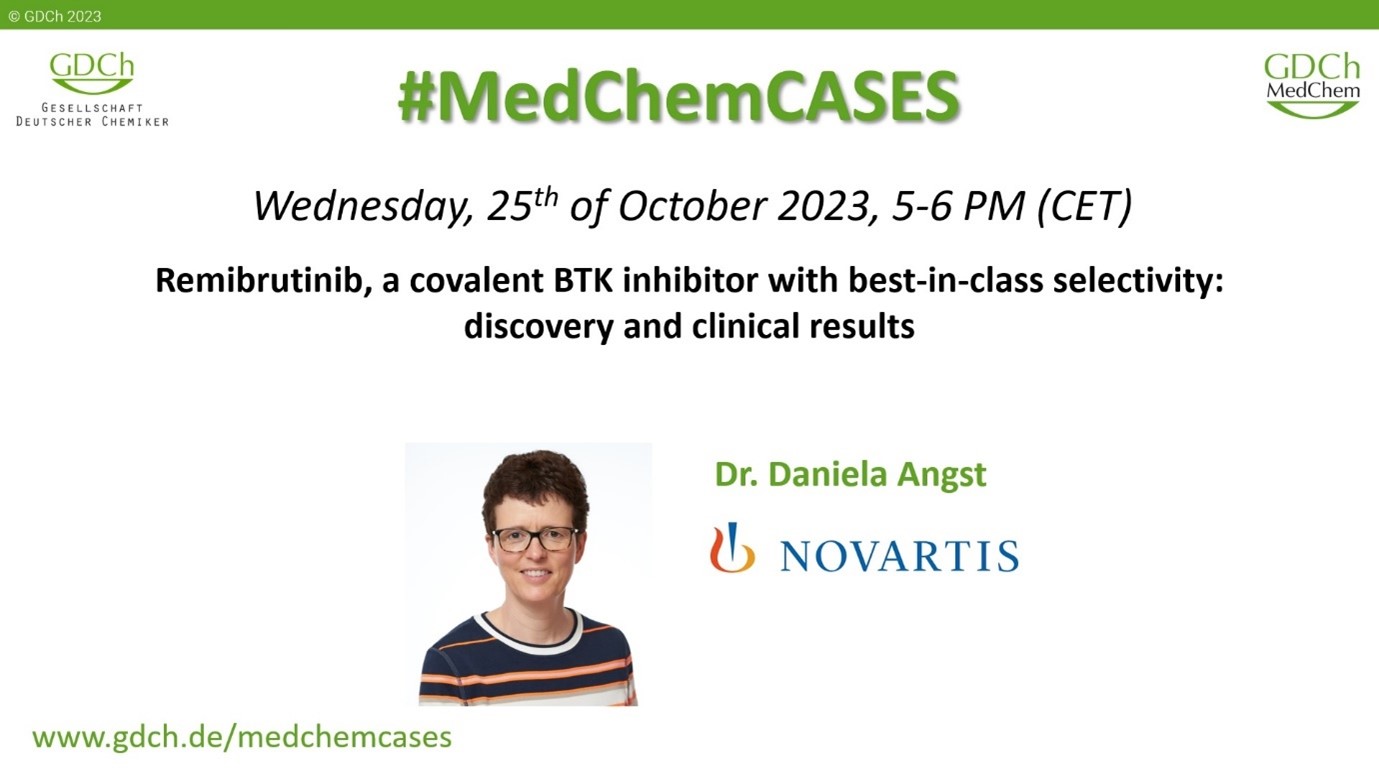
Register for free here.
#GDCh (MedChem Division), #NextGenMedChem. NEWS FROM THE BIOLOGICAL AND MEDICINAL CHEMISTRY SECTOR (BMCS) OF THE ROYAL SOCIETY OF CHEMISTRY (RSC)
The BMCS is pleased to announce upcoming events.
Hot Topics: Targeting RNA
30th November 2023, Virtual
Registration is now open!
Website: https://www.rscbmcs.org/events/hottopicsrna23/
Synopsis: The BMCS Hot Topics online meetings are intended to highlight breaking areas of research in fields of science relevant to drug discovery. They will run as stand-alone half-day virtual events, 2-3 times per year. The programme will be targeted towards researchers working in academia or industry who would like to enhance their understanding of these nascent or developing fields. The inaugural meeting will cover relevant methods and modes of targeting RNA in drug discovery and will focus on how small molecules can accomplish this, including RNA binding and degradation, splicing modulation, and enzymes modifying RNA. There will be presentations from leading academics and industry.
RSC-BMCS Postgraduate symposium XVII
7th December 2023, University of Oxford, Oxford, UK
Abstract submissions are now open!
Registration is now open!
Website: https://www.rscbmcs.org/events/psxvii/
Synopsis: This face-to-face meeting will comprise an oral and poster presentations from PhD students and post-doctoral workers researching in biological or medicinal chemistry. In addition, the agenda will feature invited keynote speakers from industry and academia.
9th RSC-BMCS Fragment-based Drug Discovery Meeting
3rd – 5th March, 2024, Hinxton Hall Conference Centre, welcome Genome Campus, Cambridge, UK
Abstract submissions and registration is now open!
Website: https://www.rscbmcs.org/events/fragments24/
Synopsis: The aim of the 9th RSC-BMCS Fragment-based Drug Discovery meeting will be to continue the focus on case studies in Fragment-based Drug Discovery that have delivered compounds to late stage medicinal chemistry, preclinical or clinical programmes. The Fragment series was started in 2007 and continues with this theme in having over three-quarters of the presentations focused on case studies. This will be complemented by technology progress in high concentration, NMR, SPR and X-ray screening.
BMCS Conformational Design in Drug Discovery
7th March, 2024, GSK, Stevenage, UK
A date for your diary!
Website: https://www.rscbmcs.org/events/1dscd/
The BMCS Mastering MedChem VIII: 8th RSC-BMCS Symposium on Mastering Medicinal Chemistry
15th March, 2024, Burlington House, London, UK
Registration is now open
Website: https://www.rscbmcs.org/events/mastermedchem24/
Synopsis: Mastering Medicinal Chemistry VIII is the latest in an ongoing series of conferences intended to provide expert advice and guidance to new practitioners in the field of drug discovery. It has been said that “there are two types of drug discovery programmes: those that hit serious problems and those that are going to hit serious problems”. Anticipating and preparing for such problems thus accelerates the delivery of new medicines: this event will feature presentations from experienced ‘drug-hunters’ in both industry and academia, who will talk about the challenges faced in modern drug discovery, and will share best practice common to all successful medicinal chemists.
35th Medicinal Chemistry in Eastern England (Hatfield symposium)
25th April 2024, Fielder Centre, Hatfield, UK
Date for your diary!
Synopsis: Known colloquially as the “Hatfield MedChem” meeting, this is a highly successful, long-standing, one-day meeting that runs annually. The scientific program will comprise presentations showcasing medicinal chemistry case studies from tools to candidates, across a range of modalities, therapeutic areas and target classes, as well as covering more general topics at the forefront of drug discovery. The meeting aims to be informal and interactive, and is ideal for all those working in medicinal chemistry and drug discovery more widely.
3rd RSC / SCI / SEQT New Therapeutics for Global Health
19th – 21st June 2024, GSK TresCantos, Madrid
RSC/SCI/SEQT
Registration will be open soon! Keep checking website for updates!
Website: https://www.rscbmcs.org/events/ntgh24/
Synopsis: Tuberculosis, malaria and diseases caused by a diverse range of pathogens, including flaviviruses (eg dengue, West Nile), kinetoplastids (causative agents of Chagas disease, leishmaniasis, etc) and gut pathogens (worms, bacteria, parasites), remain a cause of high mortality across the globe. Fortunately, an ever-improving understanding of the complex life-cycles of these disease-causing pathogens is presenting increasing opportunities for those seeking to tackle these global health problems.
9th GPCRs in Medicinal Chemistry
2nd – 4th October 2024, Evotec Campus Levi-Montalchini, Verona, Italy
RSC/SCI
Registration will be open soon! Keep checking website for updates!
Website: https://www.rscbmcs.org/events/gpcrs24/
Synopsis: The key role of G protein-coupled receptors (GPCRs) in human disease underpins their importance to modern medicine. We were pleased to hold this 9th meeting in the series on GPCR drug discovery, which combined cutting edge medicinal chemistry with innovative structural biology and novel drug design approaches. THIS NEWSLETTER IS KINDLY SPONSORED BY
|
|
|
|
|
|
ISSUE SPONSORED BY

Transform your DMTA (design-make-test-analyze) cycle by optimizing collaboration! Cresset's complete software solutions can help you to discover, design, optimize and synthesize the best small molecules. Integration of Cresset’s in silico CADD software and the Torx® DMTA platform will help you to make better design decisions and accelerate your drug discovery workflow.
Read more
EFMC ORGANISED EVENTS
November 16-18, 2023
Basel, Switzerland
EFMC International Symposium on Chemical Biology (EFMC-ISCB)
April 8-11, 2024
Utrecht, The Netherlands
EFMC-ACSMEDI Medicinal Chemistry Frontiers 2024
April 21-24, 2024
Oegstgeest, The Netherlands
18th EFMC Short Course on Medicinal Chemistry
September 1-5, 2024
Rome, Italy
XXVIII EFMC International Symposium on Medicinal Chemistry (EFMC-ISMC 2024)
September 5-6, 2024
Rome, Italy
11th EFMC Young Medicinal Chemists' Symposium (EFMC-YMCS 2024)
EFMC SPONSORED EVENTS
December 7, 2023
Oxford, United Kingdom
RSC-BMCS Postgraduate Symposium XVII
December 8, 2023
Brussels, Belgium
MedChem 2023
January 24-26, 2024
Orsay, France
SCF Chemical Biology Symposium 2024 – Chemistry meets Biology
January 28-February 1, 2024
St. Anton, Austria
4th Alpine Winter Conference on Medicinal and Synthetic Chemistry
JOB PORTAL
Junior/Mid-career Group Leader position in Chemistry applied to Life Sciences, Institut Pasteur, FRANCE
Read more
Professor Doctor, University of Sao Paulo, BRAZIL
Read more
Project lead for next-gen drug discovery, Aqemia, FRANCE
Read more
Senior Medicinal Chemist, Aqemia, FRANCE
Read more
Drug Hunter, Aqemia, FRANCE
Read more
Senior Biologist, Aqemia, FRANCE
Read more
|
|
